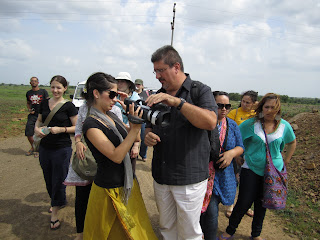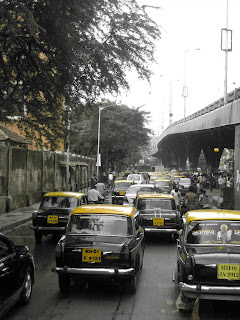 Guest Blogger: Rafael Angulo, Associate Clinical Professor
Guest Blogger: Rafael Angulo, Associate Clinical ProfessorThe Chilean documentary filmmaker, Patricio Guzman quipped about the relevancy of the documentary format when he stated that "a country without documentaries is like a family without a photo album." When we almost meditatively examine our own family photo albums, we are deeply moved by the context, memories and the emerging feelings associated with the images. The photo album provides a glimpse (as if looking through a window) into our developmental history and the relational resources that were available for our growth and maturation. The picture of our mother when she was 22 years old is not just an image created by light. It contains the deeper and most noble of struggles to be human.
The documentary also provides a glimpse into the soul of a country. Who are the heroes and heroines? What are the events that most impact a nation? Who holds power and who is fighting for power? What are the values that drive a nation forward or backward?
However, the doc is also a tool for purposes of breaking the illusion of our separateness. The students who attended the Global Immersion trip to India had the opportunity to focus the camera on the other and recognize that we are in deep relation with each other. Perhaps not be creed, geographic area, SES, or language but by the drive for human liberation. Our approach is somewhat similar to what the great Russian director, Sergei M. Eisenstein called "cine-dialectics" - the use of images to stimulate thought. Whereas Eisenstein used this method to promote a sympathetic sense of the Bolshevik revolution, our purpose is to illuminate the deep-seated drive for liberation within individuals and groups in different types of socio-political systems. The first step in any liberation process is the adoption of a critical stance, an awareness of what must be changed or abandoned.
 For our social work students, their filming of the rural and urban problems in the largest democracy in the world creates an imprint in their individual and collective soul a healthy "shock of recognition" of what is both beautiful about the Indian people and what are the structures that reinforce oppressive systems of injustice. In the Mexican film, 'John Reed: Insurgent', we view the growth in political awareness of an American journalist who, while in Mexico to report on Pancho Villa and the revolution, gradually became convinced of the injustice of the uprising and dedicated himself to similar causes around the world as an international correspondent. From being a "participant-observer," John Reed grew to take a stand 'in' history, not alongside it. His story is a fascinating study in the psychology of conversion.
For our social work students, their filming of the rural and urban problems in the largest democracy in the world creates an imprint in their individual and collective soul a healthy "shock of recognition" of what is both beautiful about the Indian people and what are the structures that reinforce oppressive systems of injustice. In the Mexican film, 'John Reed: Insurgent', we view the growth in political awareness of an American journalist who, while in Mexico to report on Pancho Villa and the revolution, gradually became convinced of the injustice of the uprising and dedicated himself to similar causes around the world as an international correspondent. From being a "participant-observer," John Reed grew to take a stand 'in' history, not alongside it. His story is a fascinating study in the psychology of conversion.From my conversations with students, this conversion also took place while both observing and filming. They were able to view the structural issues that impact a nation and a people and at the same time what entertains one person can educate-even liberate-another.
 Note: Please know that a documentary film of this trip will be available in early October 2010.
Note: Please know that a documentary film of this trip will be available in early October 2010.
 Guest Blogger: Olivia Carrillo, MSW '10
Guest Blogger: Olivia Carrillo, MSW '10









 As we exited the bus we noticed the significant difference in this community from those which we have driven through since our arrival in Mumbai. The streets were clean. The buildings, although as old as in other areas in the city, were more maintained. Lush green expansive parks, some specifically designated as was the fully equipped park for children, another a park for people to walk their dogs, and then a very large park for all within the community to partake . Our first stop was to view an amazing apartment building made to resemble the ancient Temple in Iran. Each component of the building's extensive facade was carefully explained to us by Tal, Binaifer's husband. From there we walked to the Dadar Athorian Institute a religious and educational facility established in 1919, providing male children of the priests, ages 5-14, religious and secular training and classes in a boarding school environment. In the large hall the Principal advised us that we would get to
As we exited the bus we noticed the significant difference in this community from those which we have driven through since our arrival in Mumbai. The streets were clean. The buildings, although as old as in other areas in the city, were more maintained. Lush green expansive parks, some specifically designated as was the fully equipped park for children, another a park for people to walk their dogs, and then a very large park for all within the community to partake . Our first stop was to view an amazing apartment building made to resemble the ancient Temple in Iran. Each component of the building's extensive facade was carefully explained to us by Tal, Binaifer's husband. From there we walked to the Dadar Athorian Institute a religious and educational facility established in 1919, providing male children of the priests, ages 5-14, religious and secular training and classes in a boarding school environment. In the large hall the Principal advised us that we would get to
 Guest Blogger: Kristin Teti, 2nd-Year Part-Time MSW Student, Skirball
Guest Blogger: Kristin Teti, 2nd-Year Part-Time MSW Student, Skirball At first, one may question (as I did) the value of such social work – how could such a program lead to large-scale change in the status of women in India, especially a woman in poverty? But after hearing from the President of Parisar Vikas, I cannot question the enormous impact this enterprise has on the individual, family and community levels. Without Parisar Vikas, these women are left no other choice than to employ their own children in order to eat. Therefore, obtaining the most basic education and healthcare must take a backseat. Parisar Vikas empowers women to take control over their employment and as a group they are able to establish a line of credit, which ultimately equates to some financial freedom. As a result, their children can go to school instead of pick through waste and they will grow healthier and more educated than the generation before them.
At first, one may question (as I did) the value of such social work – how could such a program lead to large-scale change in the status of women in India, especially a woman in poverty? But after hearing from the President of Parisar Vikas, I cannot question the enormous impact this enterprise has on the individual, family and community levels. Without Parisar Vikas, these women are left no other choice than to employ their own children in order to eat. Therefore, obtaining the most basic education and healthcare must take a backseat. Parisar Vikas empowers women to take control over their employment and as a group they are able to establish a line of credit, which ultimately equates to some financial freedom. As a result, their children can go to school instead of pick through waste and they will grow healthier and more educated than the generation before them.



